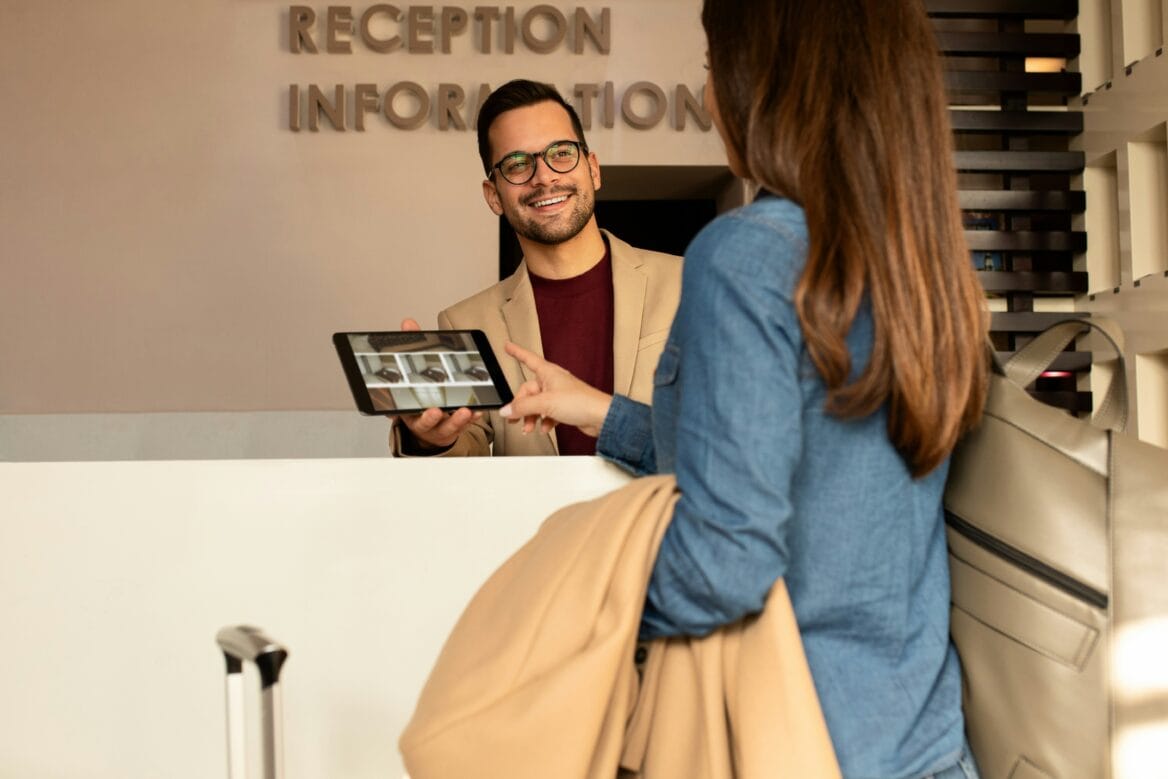Hospitality is no longer just about service.
In the past, a warm welcome at the front desk and impeccable housekeeping were often enough to earn guest loyalty. Today, competition in the hospitality industry is far more intense—guests don’t just look for comfort, they demand personalized, connected, and frictionless experiences.
According to the American Hotel & Lodging Association, 35% of travelers rank high-speed Wi-Fi as the most important tech feature when choosing a hotel, while 14% prioritize mobile check-in and keyless entry. In other words, technology is a baseline requirement for staying competitive.
Guests, especially younger generations, expect experiences that match their digital lifestyles: check-in within seconds on a smartphone, smart rooms that adapt to their preferences, and tailored offers delivered at just the right moment. Personalization has become the new standard of excellence.
For Gen Z, personalized service is valued at 2.5 times higher than for Baby Boomers. Guests don’t want to feel like a number—they want to feel recognized, understood, and cared for.
Technology: The invisible engine of the experience.
From the guest’s perspective, technology looks simple: a mobile app, a digital key, or a chatbot answering questions. Behind the scenes, however, it requires a solid, secure, and scalable IT infrastructure to make everything run smoothly.
Technology has become the invisible engine driving every stage of the guest journey.
- Before the stay: Intelligent booking systems remember preferences and suggest tailored packages.
- During the stay: IoT-enabled smart rooms adjust lighting, temperature, and even music playlists to fit guest habits.
- After the stay: Well-structured CRM platforms send personalized follow-ups that boost loyalty.
Gartner predicts that by 2026, Generative AI will transform up to 70% of digital application development processes. What seems futuristic today will soon become a minimum expectation.
Those who embrace these technologies now secure not only a competitive advantage but also long-term relevance in an industry where innovation moves fast.
Efficiency & revenue: Two sides of the same coin.
Personalization isn’t just about delighting guests—it also directly improves revenue and reduces operational costs.
McKinsey highlights that integrating digital tools, analytics, and AI can boost profitability by up to 25% .
Here’s what that looks like in practice:
- Mobile check-in: Cuts wait times at reception, lowers staffing costs, and improves satisfaction.
- Digital upselling: Mobile apps can prompt upgrades or late checkouts at the right time, raising ADR (Average Daily Rate).
- Smart rooms & predictive maintenance: IoT sensors identify issues before guests notice, reducing emergency calls and negative reviews.
Meanwhile, business travel is continuing its recovery: global corporate travel spending is projected to hit $1.57 trillion in 2025, marking a 6.6% year-over-year increase—with the U.S. accounting for an estimated $395.4 billion of that total. This rebound—even if more tempered than in previous years—makes operational efficiency and personalization more critical than ever.
Security as the foundation of trust.
There’s a flip side to personalization: the more guest data you collect, the more attractive a target you become for cyberattacks.
The Verizon Data Breach Investigations Report found that in hospitality, 92% of breaches involve system intrusions, social engineering, or web app attacks.
It’s not just about financial loss. A data breach undermines the very foundation of hospitality: trust.
On top of that, regulatory requirements are tightening. The PCI DSS v4.0.1 standard became mandatory on March 31, 2025. This means hotels of every size must adopt robust practices for securing payment systems and sensitive data.
Best practices like network segmentation, multi-factor authentication, Zero Trust frameworks, automated backups, and 24/7 monitoring are no longer “nice-to-haves”—they are essential for safeguarding both guest confidence and business continuity.
The KPIs that really matter.
Technology is only valuable if it moves the metrics that matter most. Some of the key performance indicators hospitality leaders should track include:
- Time to room: Minutes from guest arrival to room access.
- Upselling rate: Percentage of guests who purchase upgrades or add-ons.
- NPS/CSAT scores: Segmented by families, business travelers, or bleisure guests.
- Ticket deflection: Percentage of guest requests resolved by virtual concierge without staff intervention.
- RevPAR and GOPPAR: Profitability metrics tied to both experience and efficiency.
By linking guest experience metrics with operational performance, hotels can clearly see where technology creates value and where it needs fine-tuning.
A roadmap for transformation.
Every property has its own story, guest mix, and challenges. But successful digital transformation usually follows a common path:
- Within 90 days: Roll out mobile check-in, guest Wi-Fi portals with transparent consent, and dashboards to track key KPIs.
- Within 3–6 months: Implement a Customer Data Platform (CDP), deploy an AI-powered concierge with seamless human handoff, and integrate in-stay upselling.
- Within 12 months: Migrate critical systems to the cloud, strengthen security with Zero Trust and network segmentation, and launch continuous optimization programs.
This phased approach ensures quick wins while building a sustainable long-term foundation.
Why you need the right IT partner.
The reality is that very few hotels can manage all this in-house. Running secure networks, maintaining uptime, integrating cloud systems, and staying compliant with regulations requires specialized expertise.
That’s why working with a Managed Service Provider (MSP) can be a game-changer. We are a strategic ally that simplifies processes, reduces risk, and frees up staff to focus on what they do best: creating memorable guest experiences.
How We Can help
In a world where digital experience defines hospitality, making processes smarter, more secure, and more efficient isn’t optional.
With a personalized approach and a 24/7 support team, we help independent hotels, boutique properties, and chains optimize their IT infrastructure and embrace digital transformation with confidence.
- IT Consulting & Strategy: Tailored roadmaps for growth, sustainability, and compliance.
- Managed IT Services: Proactive monitoring and continuous support to ensure uptime during peak seasons.
- Cloud Solutions: Secure, scalable cloud infrastructure to simplify operations and cut costs.
- Cybersecurity: Advanced defenses, POS protection, automated backups, and smart firewalls.
- Hardware & Procurement: Reliable, energy-efficient technologies with a focus on cost-effectiveness and durability.
Talk with us to discover how to streamline operations, protect your data, and deliver a guest experience that goes beyond expectations. The future of hospitality is already here—let’s make sure your property is ready to lead it.

